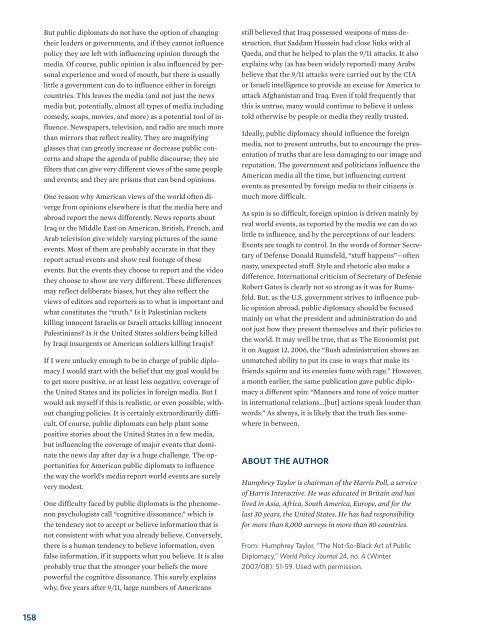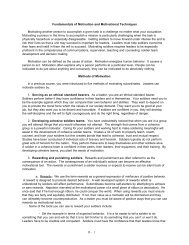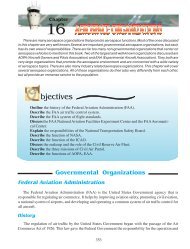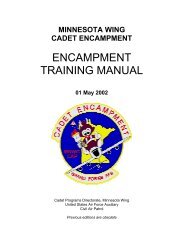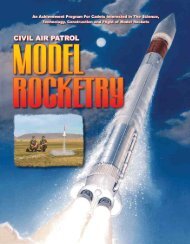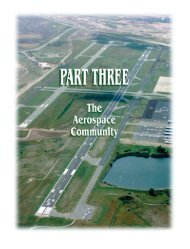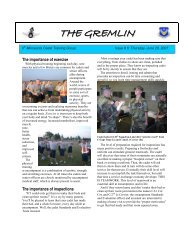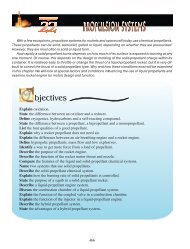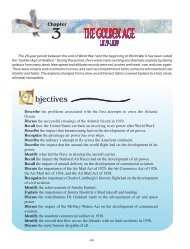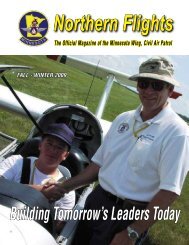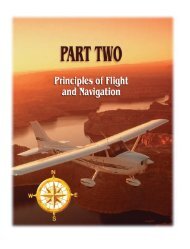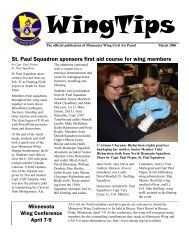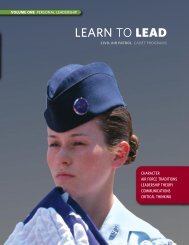LEARN TO LEAD - Civil Air Patrol
LEARN TO LEAD - Civil Air Patrol
LEARN TO LEAD - Civil Air Patrol
Create successful ePaper yourself
Turn your PDF publications into a flip-book with our unique Google optimized e-Paper software.
But public diplomats do not have the option of changingtheir leaders or governments, and if they cannot influencepolicy they are left with influencing opinion through themedia. Of course, public opinion is also influenced by personalexperience and word of mouth, but there is usuallylittle a government can do to influence either in foreigncountries. This leaves the media (and not just the newsmedia but, potentially, almost all types of media includingcomedy, soaps, movies, and more) as a potential tool of influence.Newspapers, television, and radio are much morethan mirrors that reflect reality. They are magnifyingglasses that can greatly increase or decrease public concernsand shape the agenda of public discourse; they arefilters that can give very different views of the same peopleand events; and they are prisms that can bend opinions.One reason why American views of the world often divergefrom opinions elsewhere is that the media here andabroad report the news differently. News reports aboutIraq or the Middle East on American, British, French, andArab television give widely varying pictures of the sameevents. Most of them are probably accurate in that theyreport actual events and show real footage of theseevents. But the events they choose to report and the videothey choose to show are very different. These differencesmay reflect deliberate biases, but they also reflect theviews of editors and reporters as to what is important andwhat constitutes the “truth.” Is it Palestinian rocketskilling innocent Israelis or Israeli attacks killing innocentPalestinians? Is it the United States soldiers being killedby Iraqi insurgents or American soldiers killing Iraqis?If I were unlucky enough to be in charge of public diplomacyI would start with the belief that my goal would beto get more positive, or at least less negative, coverage ofthe United States and its policies in foreign media. But Iwould ask myself if this is realistic, or even possible, withoutchanging policies. It is certainly extraordinarily difficult.Of course, public diplomats can help plant somepositive stories about the United States in a few media,but influencing the coverage of major events that dominatethe news day after day is a huge challenge. The opportunitiesfor American public diplomats to influencethe way the world’s media report world events are surelyvery modest.One difficulty faced by public diplomats is the phenomenonpsychologists call “cognitive dissonance,” which isthe tendency not to accept or believe information that isnot consistent with what you already believe. Conversely,there is a human tendency to believe information, evenfalse information, if it supports what you believe. It is alsoprobably true that the stronger your beliefs the morepowerful the cognitive dissonance. This surely explainswhy, five years after 9/11, large numbers of Americansstill believed that Iraq possessed weapons of mass destruction,that Saddam Hussein had close links with alQaeda, and that he helped to plan the 9/11 attacks. It alsoexplains why (as has been widely reported) many Arabsbelieve that the 9/11 attacks were carried out by the CIAor Israeli intelligence to provide an excuse for America toattack Afghanistan and Iraq. Even if told frequently thatthis is untrue, many would continue to believe it unlesstold otherwise by people or media they really trusted.Ideally, public diplomacy should influence the foreignmedia, not to present untruths, but to encourage the presentationof truths that are less damaging to our image andreputation. The government and politicians influence theAmerican media all the time, but influencing currentevents as presented by foreign media to their citizens ismuch more difficult.As spin is so difficult, foreign opinion is driven mainly byreal world events, as reported by the media we can do solittle to influence, and by the perceptions of our leaders.Events are tough to control. In the words of former Secretaryof Defense Donald Rumsfeld, “stuff happens”—oftennasty, unexpected stuff. Style and rhetoric also make adifference. International criticism of Secretary of DefenseRobert Gates is clearly not so strong as it was for Rumsfeld.But, as the U.S. government strives to influence publicopinion abroad, public diplomacy should be focusedmainly on what the president and administration do andnot just how they present themselves and their policies tothe world. It may well be true, that as The Economist putit on August 12, 2006, the “Bush administration shows anunmatched ability to put its case in ways that make itsfriends squirm and its enemies fume with rage.” However,a month earlier, the same publication gave public diplomacya different spin: “Manners and tone of voice matterin international relations...[but] actions speak louder thanwords.” As always, it is likely that the truth lies somewherein between.ABOUT THE AUTHORHumphrey Taylor is chairman of the Harris Poll, a serviceof Harris Interactive. He was educated in Britain and haslived in Asia, Africa, South America, Europe, and for thelast 30 years, the United States. He has had responsibilityfor more than 8,000 surveys in more than 80 countries.From: Humphrey Taylor, “The Not-So-Black Art of PublicDiplomacy,” World Policy Journal 24, no. 4 (Winter2007/08): 51-59. Used with permission.158


